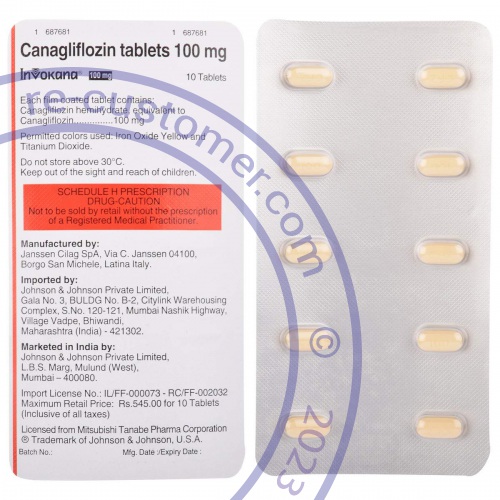- Trusted Tablets
- Cukrzycy
- Invokana®

Brand(s): Invokana
Producent: Johnson & Johnson
Choroby: Diabetes
| Pakiet | Cena | Za tabletka | Oszczędności | Zamówienie |
|---|---|---|---|---|
| 100mg × 90 tabletki | zl 1694.69 | zl 18.83 | zl 338.60 | Dodaj do koszyka |
| Darmowe wysyłki pocztą lotniczą | ||||
| 100mg × 60 tabletki | zl 1242.72 | zl 20.71 | zl 112.80 | Dodaj do koszyka |
| Darmowe wysyłki pocztą lotniczą | ||||
| 100mg × 30 tabletki | zl 677.76 | zl 22.59 | Dodaj do koszyka | |
| Darmowe wysyłki pocztą lotniczą | ||||
Canagliflozin tablets
What is canagliflozin?
Canagliflozin is used together with diet and exercise to improve blood sugar control in adults with type 2 diabetes mellitus.
Canagliflozin is also used to lower the risk of death from heart attack, stroke, or heart failure in adults with type 2 diabetes who also have heart disease.
Canagliflozin is also used to reduce the risk of end-stage kidney disease and hospitalization or death from heart problems in adults who also have kidney problems caused by type 2 diabetes.
Canagliflozin is not for treating type 1 diabetes.
Canagliflozin may also be used for purposes not listed in this medication guide.
Warnings
You should not use canagliflozin if you have severe kidney disease or if you are on dialysis.
Canagliflozin can cause serious infections in the penis or vagina. Get medical help right away if you have burning, itching, odor, discharge, pain, tenderness, redness or swelling of the genital or rectal area, fever, or if you don't feel well.
Before taking this medicine
You should not use canagliflozin if you are allergic to it, or if you have:
- severe kidney disease (or if you are on dialysis).
Canagliflozin may increase your risk of lower leg amputation, especially if you have had a prior amputation, a foot ulcer, heart disease, circulation problems, or nerve damage.
Tell your doctor if you have ever had:
- heart problems;
- a diabetic foot ulcer or amputation;
- circulation problems or nerve problems in your legs or feet;
- kidney disease;
- liver disease;
- bladder infections or other urination problems;
- a pancreas disorder;
- if you drink often, or drink large amounts of alcohol;
- if you are eating less than usual; or
- if you are on a low salt diet.
Follow your doctor's instructions about using canagliflozin if you are pregnant. Blood sugar control is very important during pregnancy, and your dose needs may be different during each trimester.
You should not use canagliflozin during the second or third trimester of pregnancy.
You should not breastfeed while using this medicine.
Canagliflozin is not approved for use by anyone younger than 18 years old.
How should I take canagliflozin?
Follow all directions on your prescription label and read all medication guides or instruction sheets. Your doctor may occasionally change your dose. Use the medicine exactly as directed.
Canagliflozin is usually taken once per day, before the first meal of the day.
You may have very low blood pressure while taking this medicine. Call your doctor if you are sick with vomiting or diarrhea, or if you are sweating more than usual. Drink plenty of liquids while you are taking canagliflozin.
You may have low blood sugar (hypoglycemia) and feel very hungry, dizzy, irritable, confused, anxious, or shaky. To quickly treat hypoglycemia, eat or drink a fast-acting source of sugar (fruit juice, hard candy, crackers, raisins, or non-diet soda).
Your doctor may prescribe a glucagon injection kit in case you have severe hypoglycemia. Be sure your family or close friends know how to give you this injection in an emergency.
Also watch for signs of high blood sugar (hyperglycemia) such as increased thirst or urination.
Blood sugar levels can be affected by stress, illness, surgery, exercise, alcohol use, or skipping meals. Ask your doctor before changing your dose or medication schedule.
Canagliflozin is only part of a complete treatment program that may also include diet, exercise, weight control, blood sugar testing, and special medical care. Follow your doctor's instructions very closely.
This medicine can affect the results of certain medical tests. Tell any doctor who treats you that you are using canagliflozin.
Store at room temperature away from moisture and heat.
What should I avoid while taking canagliflozin?
Avoid getting up too fast from a sitting or lying position, or you may feel dizzy.
Canagliflozin side effects
Get emergency medical help if you have signs of an allergic reaction: hives; difficult breathing; swelling of your face, lips, tongue, or throat.
Seek medical attention right away if you have signs of a genital infection (penis or vagina): burning, itching, odor, discharge, pain, tenderness, redness or swelling of the genital or rectal area, fever, not feeling well. These symptoms may get worse quickly.
Call your doctor at once if you have:
- a light-headed feeling, like you might pass out;
- little or no urination;
- pain or burning when you urinate;
- new pain, tenderness, sores, ulcers, or infections in your legs or feet;
- high potassium--nausea, irregular heartbeats, weakness, loss of movement;
- ketoacidosis (too much acid in the blood)--nausea, vomiting, stomach pain, confusion, unusual drowsiness, or trouble breathing; or
- dehydration symptoms--dizziness, weakness, feeling light-headed (like you might pass out).
You may be more likely to have a broken bone while using canagliflozin. Talk with your doctor about how to avoid the risk of fractures.
Side effects may be more likely to occur in older adults.
Common side effects may include:
- genital infections; or
- urinating more than usual.
This is not a complete list of side effects and others may occur.
What other drugs will affect canagliflozin?
Tell your doctor about all your other medicines, especially:
- insulin or other oral diabetes medicines;
- a diuretic or "water pill";
- digoxin, digitalis;
- rifampin;
- ritonavir; or
- seizure medication--phenobarbital, phenytoin.
This list is not complete. Other drugs may affect canagliflozin, including prescription and over-the-counter medicines, vitamins, and herbal products. Not all possible drug interactions are listed here.

Czy mogę pomóc?



